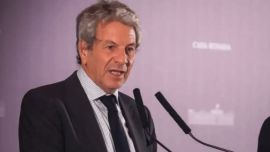In Argentina, financial markets are all but dead. From stocks to bonds to traditional foreign-exchange venues, trading volumes are razor thin after the government slapped on rigid currency restrictions in the lead up to last year’s debt default.
Except, that is, in one unusual corner of markets. There, brokerages are doing a bustling business – and raking in record profits – by handling the types of arcane transactions that Argentines use to convert pesos into dollars and circumvent the limits the government placed on obtaining foreign currencies. At least five firms reported income surges of 500 percent or more last year, with one of them, a large shop called Allaria Ledesma, posting a 2,200 percent increase.
“We’re going through a boom,” said Julio Merlini, the chief executive officer of Balanz Capital, which has doubled its client base and boosted its workforce by more than half since the controls were imposed in 2019. “People stopped investing in mutual funds and timed deposits and are dollarising portfolios.”
But as Argentines eschew traditional investments to focus on converting their assets to dollars before the peso weakens even further, banks are forbidden from operating in the so-called blue-chip swap markets used to get foreign currency. That helped lead the sector to its worst performance in 13 years. A steady stream of bankers have left to join brokerages since the restrictions were put in place in 2019, with Merlini estimating they can earn about 50 percent more in their new jobs.
It’s all part of the fallout from former president Mauricio Macri’s decision to impose capital controls amid a rush for the doors after the political opposition won a key primary in 2019. The move left foreign investors with no easy way to get their money out of the country, and crimped the ability of Argentines to buy dollars, leaving them to either watch the value of their peso savings tumble amid rampant inflation or seek an escape in the blue-chip swap.
Called the 'Contado Con Liquidación' in Spanish, the swap has been around for almost two decades in Argentina, with use peaking when restrictions are dialled up and the peso’s prospects deteriorate. It’s usually undertaken by buying peso assets locally and then selling them abroad for dollars, creating an exchange rate that’s currently about 38 percent weaker than the official one.
It’s one of a number of parallel rates that have taken hold in Argentina amid the economic turmoil of the past few years. The country has been rocked by a 60 percent drop for the peso since the end of 2018, a US$60-billion default by the federal government and the worst economic collapse since 2002 last year amid one of the region’s strictest pandemic lockdowns.
As the blue-chip swap took off, more typical financial transactions have seen reduced volumes. Financial entities traded a daily average of US$167 million in the spot foreign-exchange market last year, down 67 percent from a year earlier. Fixed-income volume in the Mercado Abierto Electronico, which is owned by banks, fell by more than half to US$96 billion.
At the Argentine Stock Exchange, mostly the domain of brokers, fixed-income volumes jumped 57 percent in 2020 to US$247 billion.
The shifts have propelled a surge in bank departures as investment professionals seek out higher wages and less regulatory scrutiny. At least a dozen prominent bankers have made the switch since mid-2019, including HSBC Plc trader Juan Manuel Truppia’s jump to TPCG Valores. Other high-profile moves include Manuel Rocha-Nan’s switch from head of corporate sales at Banco Galicia to Max Capital, and Carolina Gialdi, a fixed-income strategist at BTG Pactual, who also joined Max Capital.
“The brokers today are fed by the banks,” said Juan Rodríguez Braun, a partner at Max Capital, which increased its workforce by 25 percent in 2020 to 50 employees. Making the move “offers higher remuneration associated with the results of the company.”
by Ignacio Olivera Doll, Bloomberg




















Comments